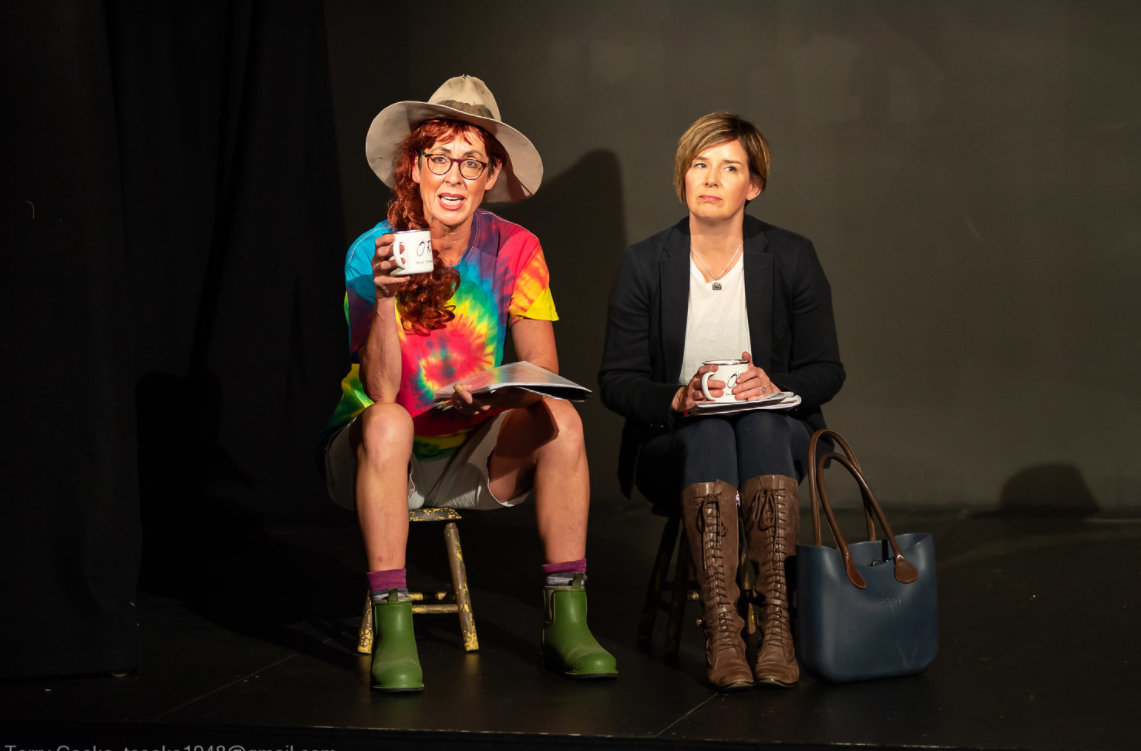When she's not teaching the principles of management as a lecturer in the UNE Business School, you might find Valerie Dalton treading the boards in disguise, during a local theatre production.
What is your private passion and how did it develop?
Acting! I did a little when I was in school, as many people would have, but didn't pursue it afterwards, though there was always an interest. My passion was sparked during my PhD research in 2014 of the Greening the Wharf project, the Sydney Theatre Company's (STC) highly successful environmental sustainability program. While there, I was able to attend a company run with a live audience (where staff go along to watch late-stage rehearsals to see how the production works) of the production Noises Off, and attended a couple of other productions.
It took me until 2016 to finally work up the gumption to audition (my major stumbling block) for a role with the Armidale Drama and Musical Society. Luckily, I was given the part, by fellow UNE staff member and prolific local director Mark Bourne. I have now been in three full plays with the society, as well as some short plays, and absolutely love it. I still find it bizarre that I second-guess myself in so many aspects of my life yet feel completely comfortable on stage.
What does it involve and how much of your time does it consume?
It depends. Short plays that are offered over a couple of weekends each year (Favourite Shorts) do not require that I memorise lines and are usually once a week for a few weeks ahead of performances. Long plays are two nights a week and Sunday afternoon for eight weeks leading up to performances, which run for two weeks of three shows and a matinee each week.
How does this passion enrich your life?
There is great camaraderie among the cast and crew as we rehearse and perform. It is also completely absorbing – I love playing with accents and thinking about the character I am playing and what drives them. Unlike many things in work and life, each play has a very set life – you know that you will be on stage by a particular date and you get very focused on making sure you are ready for that first performance. There are no deadline extensions for a theatre production. Everyone is very clear that we had better have it all right by opening night.
I've played an Essex trophy wife, the daughter of a Mallee farmer and a recovering alcoholic New Yorker. The Essex accent wasn't a stretch, because my partner is from Kent. I am hoping to play someone from Dublin later this year. It's not my native Irish accent (I was mainly raised in County Cork before migrating to Australia) but I have family in Dublin and love that accent, too.
In my next role, in In Bed with the Bishops, on this month, I'm playing an Australian celebrity influencer. She's a very controlled Princess Perfect, who has a TV show teaching others how to emulate her. She and her hapless husband are in couples therapy, which is where all the action takes place. It’s a new Australian play written by a psychiatrist and it's very funny.
What (if anything) does this personal passion and your enjoyment of it bring to your working life?
Rehearsals and playing with character during preparations for a dramatic production are creative and collaborative processes. Working in a business school within a university context, there is a tendency to emphasise rationality and logic and analysis over creativity, intuition and emotion.
When STC Executive Director and ex-Armidale lad Patrick McIntyre presented to our management students back in 2013, his talk was titled, ‘Soft is the New Hard’. In other words, the so-called soft skills are equally if not more important than hard, analytical skills. He spoke of STC being invited into big corporations to run training on encouraging creativity and collaboration among staff. One of the units I teach delves into that tension between the analytic and the intuitive when it comes to thinking and decision-making.
The World Economic Forum talks about the skills we will need in 2025. The top one is analytical thinking and innovation. While analysis is a comfortable place for many, innovation is a creative process. The skills that round out the forum's list bear that out: active learning, complex problem-solving, creativity, originality and initiative.
Do you have other personal passions you would like to share?
I work with the local Ezidi community in Armidale, helping with home reading. I also serve as the treasurer for Armidale Sanctuary, a local charity that works to help settle and support refugee families. That also feeds into some of my academic research, which explores how regional communities can help refugees to thrive.


